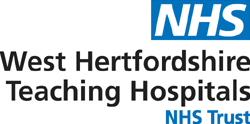Annual Report 2007-2008
Operational Review
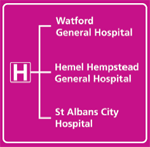 Throughout 2007/08, the Trust provided health services at Hemel Hempstead General
Hospital, Watford General Hospital and St Albans City Hospital. It employs around 4000
staff working in over 50 different professions to serve the catchment area of west
Hertfordshire, with a population of over 500,000 and wider as people choose to attend
our hospitals.
Throughout 2007/08, the Trust provided health services at Hemel Hempstead General
Hospital, Watford General Hospital and St Albans City Hospital. It employs around 4000
staff working in over 50 different professions to serve the catchment area of west
Hertfordshire, with a population of over 500,000 and wider as people choose to attend
our hospitals.
The Trust's key relationships in the delivery of care continues to be with the West Hertfordshire PCT, General Practitioners/Practice Based Commissioners, community based healthcare staff, and local social services. The development of practice based commissioning by GPs is bringing closer engagement between GPs and the Trust.
The Trust's overarching aims are to minimise hospital acquired infections, implement fully Delivering a Healthy Future, to achieve Foundation Trust (FT) status and to open the new acute west Hertfordshire hospital in 2015. To achieve FT status, a five year Integrated Business Plan and Financial Model were submitted to NHS East of England (the Strategic Health Authority, (SHA)) in January 2008. This is an iterative process, which should see the Trust seeking approval to be a Foundation Trust in early 2009.
The Delivering a Healthy Future strategy focuses on service development and service improvement for patients. Phase 1, the move of elective surgery to St Albans, was implemented in September 2007; Phase 2, the implementation of the Acute Admissions Unit at Watford, is planned for early 2009, and Phase 3 will be the migration from a district general hospital at Hemel Hempstead to a local general hospital.
Reaching out to our local community is a priority. Our work with Patient Forums and Patient and Public Involvement Groups develops a community-based approach to ensure relationships with key stakeholders are nurtured.
Emergency Preparedness
The NHS faces increasing challenges in the area of emergency planning. The Trust is committed to adopting a multi-agency approach to Emergency Planning and is represented on a number of external emergency planning groups led by Hertfordshire Resilience.
The Trust continually reviews and refines its emergency plans. New legislation (i.e. the Civil Contingencies Act) and new Department of Health guidelines underpin the Trust's Emergency Planning process and our plans for future developments. The Trust is compliant with Department of Health guidance for Emergency Planning and Pandemic Flu and is working towards compliance in Business Continuity.
Performance and Standards
Healthcare Commission Annual Health check
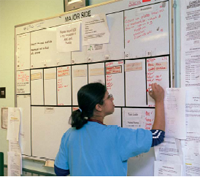 In October 2007, the Healthcare Commission rated the Trust as 'weak' for Quality of
Services and as 'weak' for Use of Resources for 2006/07 - the second year running. This was
extremely disappointing and was a blow to staff morale. In November 2007, the Trust was heading for a similar rating for 2007/08.
In October 2007, the Healthcare Commission rated the Trust as 'weak' for Quality of
Services and as 'weak' for Use of Resources for 2006/07 - the second year running. This was
extremely disappointing and was a blow to staff morale. In November 2007, the Trust was heading for a similar rating for 2007/08.
However, with a new focus and a determination to succeed, the Trust is looking forward to an improved rating and is hopeful of achieving a 'Fair' in both categories. This is a massive improvement in the latter part of the year and reflects the hard work and dedication of all staff. Although gauging staff morale is a difficult science, anecdotally it would seem that far from giving up on the Trust, improvements in performance are starting to allow staff to celebrate in their success.
Performance Targets
Not being kept waiting for appointments, not having planned operations cancelled, reducing hospital acquired infections, care in A&E and how we are dealing with our budget are things on which, quite rightly, we are judged.
The new national focus of treating everyone, from GP referral to treatment, in 18 weeks has been challenging – not just for the Trust but for the whole local health economy. In the last few months of the financial year the Trust rose to that challenge and will meet the national target for those patients not needing admission (90%), and at the end of March will be close to meeting the target for those that do need admitting (85%). These are significant improvements as the Trust was performing at 30% for those needing admission and 60% for those that did not just a few months prior.
The split of elective surgery to St Albans in September 2007 and the more complex and acute work to Watford was the right move. However, St Albans was not implemented well and we were cancelling far too many operations. This had improved dramatically by March and the Trust is now around the national average of 1% of all reportable cancellations. There are still too many cancellations at Watford, often due to the problems the local health community has with delayed discharges, but the Trust is working hard to ensure this improves.
In the first quarter of 2007, the Trust was one of the worst in the country when measured against the 4-hour wait in A&E. The Trust's A&E performance improved significantly in the latter part of 2007/08 and from being one of the worst in the country the Trust is now consistently seeing more than 98% of patients within the four hour national standard. The Trust's financial situation has improved and it has made a surplus of £2.5m in the 2007/08 financial year. Although the Trust continues to face financial challenges and will need to make additional savings and achieve better value for money in future years, this is a significant improvement over previous years.
The Trust has prioritised action to combat clostridium difficile (C. diff) and MRSA. C. diff rates have tumbled from 80 a month in November to around 15 at the end of March. MRSA rates are small and action continues to minimise the bacteraemia that result. Isolation wards in the Trust have contributed to the reduction in these figures, as has the focus and compliance on hand washing. As part of the Trust's campaign to promote hand washing and the use of hand gel, yellow badges with the slogan 'Please ask if my hands are clean' are being distributed to all clinical staff. The Trust still has a way to go, but the direction of travel and the progress made is very positive.
Environmental Performance
The Trust completed the deep clean schedule of all inpatient clinical areas by the end of March 2008.
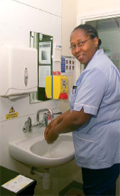 In the continuing effort to support the national specifications for cleanliness in the NHS
and reduce hospital acquired infections a number of measures have been introduced, such
as monitoring the cleaning on the wards by the ward manager, improving the bed
washing facility at St Albans and capital funds have been approved for Watford.
In the continuing effort to support the national specifications for cleanliness in the NHS
and reduce hospital acquired infections a number of measures have been introduced, such
as monitoring the cleaning on the wards by the ward manager, improving the bed
washing facility at St Albans and capital funds have been approved for Watford.
Principles of Remedy
Leading on from the Principles of Good Administration published in October 2007, the Principles of Remedy sets out the Ombudsman's view regarding how public bodies should provide remedies for injustice or hardship resulting from poor administration or poor service. For the Trust, good practice on remedies means:
- Getting it right
- Being customer focused
- Being open and accountable
- Acting fairly and proportionately
- Putting things right
- Seeking continuous improvement
Current Position
The Trust complaints procedure is in accordance with the Department of Health guidelines and was updated to incorporate the NHS Complaints Amendment (Statutory Instrument 2084). Operation of the procedures is already in line with the good practice advocated.
Standards for Better Health
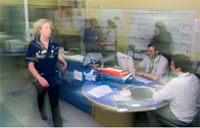 The Trust has declared compliant in 40 out of 43 core standards, including five declared as
'end of year' compliant, thereby maintaining a foothold on last year's position. The three
non-compliant Standards focus on decontamination, single sex accommodation and
public health. Action plans for these standards have been developed to ensure compliance
in 2008/09.
The Trust has declared compliant in 40 out of 43 core standards, including five declared as
'end of year' compliant, thereby maintaining a foothold on last year's position. The three
non-compliant Standards focus on decontamination, single sex accommodation and
public health. Action plans for these standards have been developed to ensure compliance
in 2008/09.
Risk Management
Significant progress has been made in the corporate management of risk. In the past year the Trust has:
- Attained good development progress by achieving 60% compliance in benchmarking against the NPSA's Seven Steps to Patient Safety
- Undertaken an Acute Trust Assessment of the NHSLA Risk Management Standards achieving Level 1 status
- Commenced implementation of the Datix e-form for Incident Reporting
- Commenced the process of logging risks associated with the Trust's infrastructure
National Targets
| The Trust’s achievements against key national targets were as follows: | The Trust did not achieve the following key national targets: |
|---|---|
| Cancer 1 month wait – the target is for 98% of patients diagnosed as having cancer to commence their treatment within one month of their GP sending the referral. In 2007/08 the trust achieved 99.9% | MRSA infections – there were 37 bacteraemia infections identified in the laboratory. Although this was fewer that the year before it was still more that the target figure of 18 for 2007/08h3 |
| Cancer 2 month wait – the target is for 95% of patients diagnosed with cancer to commenceh3 their treatment within 2 months of their GP sending the referral. In 2007/08 the trusth3 achieved 99.4% | Implementing the ‘Choose and Book’ appointments system – approximately 40% of the Trust's referrals were booked electronically during the year. Although this is above the nationalh3 average it falls short of the government’s target for the NHSh3 |
| Waiting time for planned admissions – the target is for 99.97% of patients to wait less than 26 weeks for admission. In 2007/08 the trust achieved 99.98% | A&E waiting time – 97.7% of patients attending A&E were admitted or discharged within 4 hours of arrival. This fell short of the government target of 98.0% (although this target was met and exceeded in the latter part of the year, the overall average was slightly below the national target for the whole year) |
| Waiting time for outpatient appointments – the target is for 99.97% of patients referred by their GP to wait less than 13 weeks for a first appointment with a consultant. In 2007/08 the trust achieved 100% | Reducing the number of patients whose discharge is delayed by the lack of other health or care facilities – for 2007/08, 5.7% of patients experienced some delay, against a national target of less than 3.5% |
| Waiting time for Sexual Health Services – 93.3% of patients were offered an appointment to be seen within 2 working days | Readmission within 28 days of cancellation of an operation – in 2007/08 1,247 (3.8%) of patients had their operation cancelled at short notice. Of these 246 (20%) were not offered admission within 28 days, against a target of less than 5% |
| Achieving a maximum waiting time of 18 weeks from referral to start of treatment by December 2008 – the trust is still on target to achieve this | |
| Waiting time for revascularisation procedures – the target is for 99.9% of patients to wait less than 13 weeks for revascularisation. In 2007/08 the trust achieved 100% | |
| Rapid access chest pain clinic – the target is for 98% of patients referred to the clinic to be seen within 2 weeks of referral. In 2007/08 the trust achieved 99.4% | |
| Financial performance –the trust ended the year with a £2.5m surplus |
» next: Service Developments
